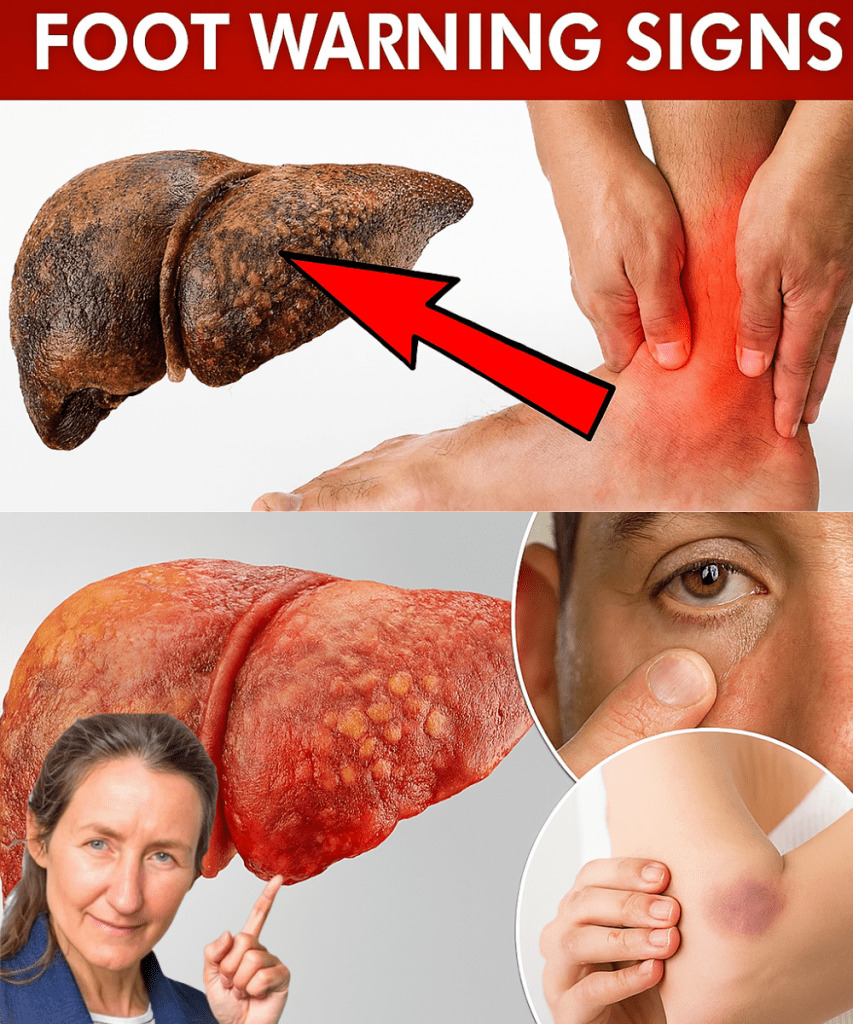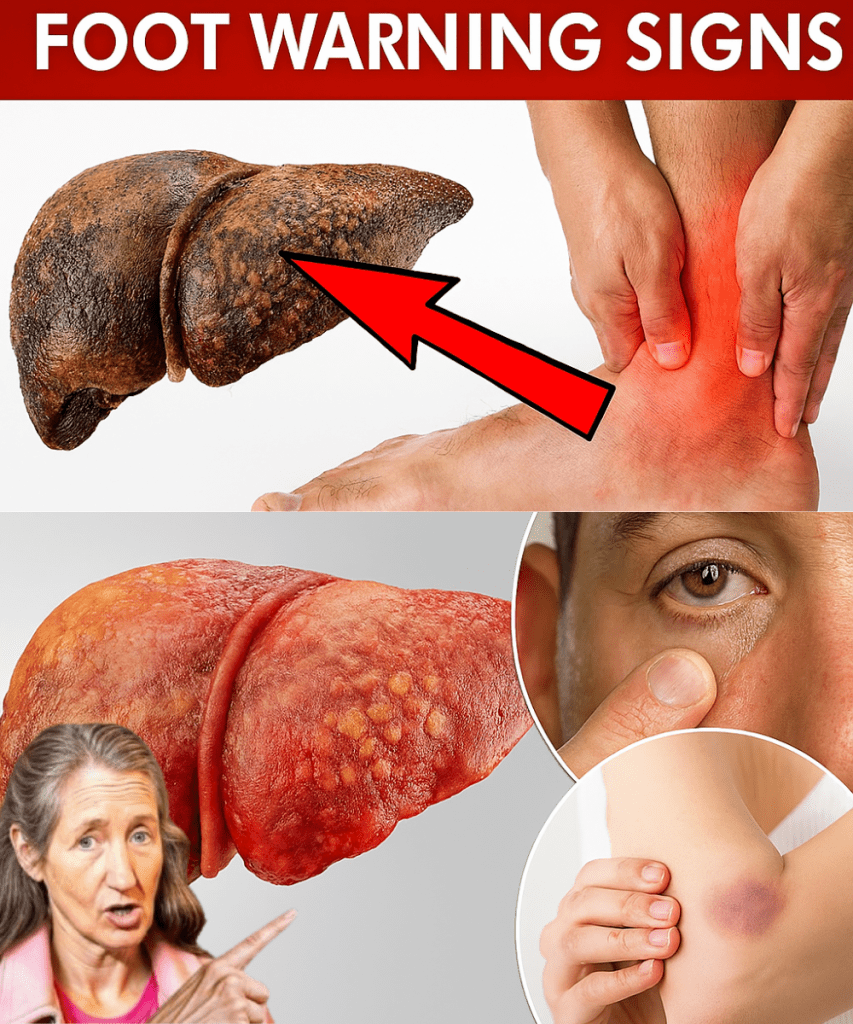Your liver is the unsung hero of your body, quietly working around the clock to detoxify your blood, aid digestion, and keep your energy soaring. But what happens when this vital organ starts to struggle? It sends out warning signals—subtle at first, but impossible to ignore if you know what to look for. Catching these signs early could be the key to preventing serious health issues and keeping your liver in top shape. Ready to uncover the 15 surprising signs your liver might be crying for help? Let’s dive in and empower you to take charge of your health!

Why Your Liver Deserves Your Attention
The liver is a powerhouse, juggling over 500 critical tasks to keep you thriving. From filtering out toxins to producing bile for digestion and storing essential nutrients, it’s the backbone of your wellness. When your liver is under stress, it doesn’t just affect one part of your body—it can throw your entire system out of balance, leading to fatigue, discomfort, or even severe conditions. By spotting the early warning signs, you can take proactive steps to support this vital organ and protect your long-term health. Curious about what your body might be trying to tell you? Keep reading to find out!
15 Early Warning Signs Your Liver Needs Help
Here are 15 telltale signs that your liver might be struggling. If any of these sound familiar, it’s time to listen to your body and take action.
🌟 1. Unrelenting Fatigue That Won’t Quit
Feeling exhausted even after a full night’s sleep? Your liver might be to blame. When it’s not functioning optimally, your body’s energy metabolism can go haywire, leaving you drained. If you’re constantly reaching for coffee just to get through the day, your liver could be sending an SOS.
👁️ 2. Yellowing Skin or Eyes (Jaundice)
A yellowish tint to your skin or the whites of your eyes is a major red flag. This condition, known as jaundice, happens when your liver can’t process bilirubin, a waste product that builds up in your blood. If you notice this symptom, don’t wait—seek medical advice immediately.
🚻 3. Dark Urine Despite Hydration
Is your urine consistently dark, even when you’re drinking plenty of water? Excess bilirubin can cause this alarming change. If your urine looks more like tea than lemonade, it’s time to pay attention to your liver health.
💺 4. Pale or Clay-Colored Stools
Your liver produces bile, which gives your stools their natural brown color. If your stools are pale, chalky, or clay-like, it could mean your liver isn’t producing enough bile—or that something’s blocking its flow. This is a sign you shouldn’t ignore.
🖐️ 5. Itchy Skin That Drives You Crazy
Unexplained itching, especially on your hands or feet, can be a surprising clue of liver trouble. When bile builds up in your skin due to liver dysfunction, it can cause persistent, frustrating itchiness. If scratching isn’t solving the problem, your liver might be the culprit.
😖 6. Abdominal Pain or Swelling
Discomfort or bloating in the upper right side of your abdomen—where your liver is located—could signal inflammation or fluid buildup. Persistent pain or a feeling of heaviness in this area is a sign to check in with your doctor.
🍽️ 7. Loss of Appetite or Feeling Full Fast
If you’re suddenly uninterested in food or feel full after just a few bites, your liver might be struggling to produce bile for proper digestion. This can also lead to nausea, making mealtime less enjoyable than it should be.
⚖️ 8. Unexplained Weight Loss
Dropping pounds without trying might sound like a dream, but it can be a warning sign. Unintentional weight loss can sometimes point to liver dysfunction, as your body struggles to process nutrients effectively.
🩹 9. Easy Bruising or Bleeding
Do you bruise at the slightest bump or notice frequent nosebleeds? Your liver produces proteins that help your blood clot. If it’s not functioning well, you might find yourself bruising or bleeding more easily than usual.
🍔 10. Chronic Indigestion After Meals
Frequent heartburn, bloating, or greasy stools after eating could mean your liver isn’t producing enough bile to break down fats. If rich meals leave you feeling off, your liver might need some TLC.
🧠 11. Confusion or Memory Lapses
A struggling liver can allow toxins to build up in your blood, affecting your brain. This can lead to forgetfulness, trouble focusing, or even mild confusion—a condition known as hepatic encephalopathy. If your mind feels foggy, your liver could be part of the problem.
🦵 12. Swollen Legs or Ankles
Puffy legs or ankles might not just be from standing too long. Fluid retention, or edema, can occur when your liver struggles to regulate blood flow, causing swelling in your lower extremities.
🕸️ 13. Spider-Like Blood Vessels on Your Skin
Small, spider-shaped veins appearing on your face, chest, or elsewhere can be a sign of liver stress. These occur due to changes in blood flow caused by liver dysfunction, making them a visible clue to watch for.
⚖️ 14. Hormonal Imbalances
Your liver plays a key role in regulating hormones. For women, irregular periods might be a sign of trouble, while men might notice reduced libido. If your hormones seem out of whack, your liver could be sending a signal.
🤢 15. Frequent Nausea, Especially After Fatty Foods
Feeling queasy after a greasy meal? Your liver might be struggling to process fats, leading to persistent nausea. If this happens often, it’s worth investigating further.
Practical Steps to Support Your Liver Health
Noticing one or more of these signs? Don’t panic—there are simple, effective ways to show your liver some love and keep it functioning at its best. Here’s how to get started:
🥗 Eat a Liver-Friendly Diet
Load up on fruits, vegetables, whole grains, and lean proteins. Foods like leafy greens, berries, and fatty fish are packed with nutrients that support liver function. Try to cut back on processed foods, sugary snacks, and saturated fats to reduce stress on your liver.
💧 Stay Hydrated
Drinking plenty of water helps your liver flush out toxins more effectively. Aim for at least 8 glasses a day, and consider adding a slice of lemon for an extra detox boost.
🍷 Limit Alcohol Intake
Excessive alcohol is one of the liver’s biggest enemies. Stick to moderate drinking—up to one drink per day for women and two for men—to keep your liver happy and healthy.
🏃 Get Moving
Regular exercise, like a brisk 30-minute walk five times a week, can improve circulation and support your liver’s detoxification processes. Plus, it’s a great way to boost your overall energy and mood!
🧼 Avoid Toxins
Limit exposure to harsh chemicals in cleaning products, pesticides, or even cigarette smoke. These can put unnecessary strain on your liver, making it work harder to keep you healthy.
💡 Pro Tip: Share these tips with a friend or family member to spread the word about liver health! A little support goes a long way in building healthy habits together.
When to Seek Medical Help
While some symptoms might be mild or caused by other factors, certain signs—like jaundice, severe abdominal pain, or confusion—are serious and require immediate medical attention. If you’re experiencing multiple symptoms or they’re getting worse, don’t hesitate to reach out to your healthcare provider. Simple tests, like blood work or imaging, can give you a clear picture of your liver’s health and help catch any issues early.

Why Early Detection Is a Game-Changer
Your liver doesn’t scream for help—it whispers. Listening to those whispers can make all the difference. Acting early can improve outcomes significantly, helping you avoid complications and stay vibrant and energized. Imagine the peace of mind that comes with knowing you’re taking care of your body’s most vital organ!
Conclusion: Take Charge of Your Liver Health Today
Your liver is working hard for you every single day—don’t let its quiet cries for help go unnoticed. From persistent fatigue to unexpected itching, these 15 warning signs are your body’s way of saying, “Hey, let’s take care of this!” By staying aware, making liver-friendly lifestyle choices, and seeking medical advice when needed, you can keep your liver thriving for years to come. What’s your favorite way to support your health—maybe a nutrient-packed smoothie or a refreshing walk? Drop your tips below and keep the conversation going! Explore more health insights on our site to fuel your wellness journey.
Disclaimer: This article is for informational purposes only and is not a substitute for professional medical advice. Always consult your doctor before making changes to your health routine.









